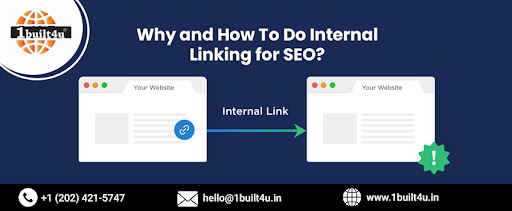
Why and How To Do Internal Linking for SEO?
Internal linking is often overlooked or undervalued when it comes to SEO services. Some focus solely on external link building and on-page search engine optimization in order to boost their rankings. However, despite the fact that those two aspects appear to be of the utmost importance to Google, internal links still play a role. Having said that, you should find this article by our SEO services in Delhi useful if you are unfamiliar with this aspect of SEO and wish to learn more about its potential benefits.
What exactly is internal linking for SEO purposes?
It is not difficult to define the concept itself. In fact, the term "internal linking" is used in this context to describe the procedure of establishing links between various pages on the same domain. On the other hand, external linking occurs when a page either links to or is linked to by another website. External links include links from other websites, backlinks from guest articles, and shares on social media.
When it comes to internal links, there are a number of reasons why they are crucial. They help visitors move from one page to the next on your website, as their name suggests. Additionally, because they enable search engines to better comprehend your website's content, they are an essential part of SEO. This, thus, assists them with deciding how to perfectly position your pages.
There are multiple kinds of internal links. You can usually find them in a website's sidebar, footer, or navigation menu, to give you an idea. The contextual links come next. These links are within the post or page's body, as depicted here. They are typically used to point the reader to a different page or to highlight content that is related to it. Finally, you can also find internal links in the breadcrumbs or as part of a plugin for related posts.
How and Why are Internal Links Beneficial to SEO?
Both humans and search engines find it easier to navigate websites with well-structured, internally linked pages. The main way Google will see your website is through outer connections. However, the internal links make it simple for them to get to other parts of the site once they are there. In this way, inward connection is fundamental assuming that you believe Google should record all of your website's content. You must include internal links in your website's content for Google to index it.
Search engines also take into account internal links when determining page rankings. They assist them in comprehending the significance of the website's content. A page's significance increases, for instance, when other pages link to it. Additionally, these links enable search engines to ascertain the page's context.
Internal Linking for Website Optimization
We are confident that our SEO company in Delhi will be able to guide you through the best internal linking practices:
- Identify Key Pages: The most important parts of your website that you want people to visit are these pages. Usually, they are static web pages, but they can also be guides. That being said, how would you really figure out what content makes the biggest difference on the website? Take into consideration the information that is the foundation of your business: the things that you want people to see when they search for your company or your particular field of expertise. That is the area that you most want to establish authority in!
- Link the Most Important Pages to the Homepage: After choosing your most important pages, you should make it easy to get to them from the homepage. Anything you link to from the primary page will get a lot of traffic because no other page has the same amount of value as it does. To really connect to a specific page from the landing page, you can use any component in your header, footer, or even sidebar. You can also use a call-to-action button or the widget for the "most popular posts."
- Create Links Between Related Articles by Writing "Audience" on the Whiteboard: Even though internal linking is very important for SEO, these links also make it easier for your audience to navigate. It is essential to establish links between articles that discuss the same or similar subjects. Why? Well, because, for the first time, it helps your readers learn more about the subject they are reading about. Additionally, it aids search engines in understanding the connection between these articles.
- Link to a Conversion Page from the Content: Internal linking for SEO may also increase conversion rates. By highlighting your expertise and knowledge, content marketing aims to attract new customers. Conversion-focused calls to action (CTAs) must therefore be incorporated into your content pages. Customers must be able to easily and quickly locate and purchase your products in order to increase your conversion rate. Fortunately, this can be accomplished by strategically placing internal links.
- Provide a Link to Tags/Categories: Tags should not be overlooked. In fact, SEO would not be what it is today without tags. Because of this, they need to be linked to make it easier for search engines to locate and categorize content. Include them in your posts to reap all of their benefits!
Relationship Between Internal Linking and SEO
Internal linking plays a crucial role in search engine optimization (SEO) by helping search engines understand the structure and relevance of your website's content. It involves linking one page of your website to another using hyperlinks. Here's the relationship between internal linking and SEO:
1) Website Structure: Internal linking helps establish a logical structure for your website. By interconnecting related pages through internal links, you create a hierarchical structure that search engines can crawl and understand. This improves the overall user experience and makes it easier for search engines to index your content.
2) Page Authority and Ranking: Internal links distribute link authority or "link juice" across your website. When high-authority pages link to other pages, it passes on some of their authority, boosting the linked pages' ranking potential. By strategically linking important pages within your website, you can improve their visibility and search engine rankings.
3) Indexing and Crawling: Internal links act as pathways for search engine bots to discover and crawl your website's content. When search engine bots follow internal links, they can index and rank your pages more effectively. Proper internal linking ensures that all pages on your website are accessible to search engines and receive the necessary attention in search results.
4) Contextual Relevance: Internal linking helps establish contextual relationships between different pages. By linking relevant keywords or phrases within your content to other related pages, you provide additional information to search engines about the topic and relevance of your content. This helps search engines understand the depth and breadth of your website's content.
5) User Experience: Internal links enhance the user experience by guiding visitors to relevant and related content. By providing easy navigation and logical pathways, users can explore your website more effectively and find the information they need. This improves user engagement and encourages longer visit durations, which are positive signals for search engine rankings.
Conclusion
Search engine optimization is all about making your information easy for people and search engines to find. One of its most important components is internal linking for SEO: one that makes your content easier to find and also makes it easier to use. Although we have provided you with a fundamental understanding of how utilizing these links can benefit your SEO efforts, you still have a lot to learn. Be prepared to make mistakes at first because utilizing this will require trial and error. However, once you have mastered using internal links, you will realize that the effort was well worth it. For more information, visit 1built4u.in.




